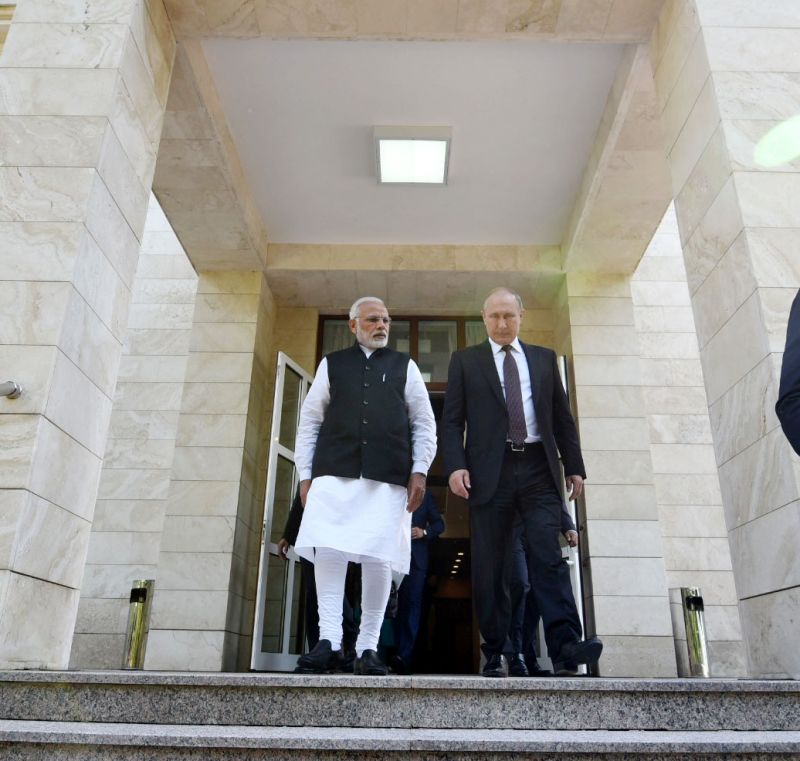SCO - Asia’s NATO in making
By Ritu Sharma

India and Pakistan have not been on talking terms since the turn of events that marked this year beginning with Pulwama attack and the following Balkot strikes by India; and then the ensuing stand-off between the two countries. However, there has been one platform where the defence ministers of the two countries have shared dais in April and very soon the Foreign Affairs Ministers will come face-to-face by the end of May – the Shanghai Cooperation Organisation (SCO).
India does not intend to hold separate bilateral with the representative of its bête noire, but it would be cooperating on many front multi-laterally. This underscores the importance of SCO, touted as ‘Asia’s NATO in making’. The grouping comprising of two of major Asian power – India and China, not only provides a gateway to Central Asia, but it also gives a semblance of a military alliance in the Asian continent.
Indian Foreign Minister Sushma Swaraj will be attending the Shanghai Cooperation Organisation Council of Foreign Minister conclave in Bishkek on May 21-22 along with her Pakistani counterpart Shah Mehmood Qureshi. The two would be part of a multilateral forum for the first time after their proposed bilateral meeting on the sides of the UN General Assembly was called off at the eleventh minute in September last year. While it would be the last day of the incumbent Indian government, it will be an opportunity for the two South Asian neighbours to work on issues of terrorism despite their baggage.
The SCO was established in Shanghai in 2001 with China, Russian, Kazakhstan, Tajikistan and Uzbekistan as founding members. In 2017, India and Pakistan were included as full members after being observers in the grouping for 12 years. Afghanistan, Belarus, Iran and Mongolia are currently observer countries of the organization. Moreover, SCO also consists of six dialogue partner countries namely Azerbaijan, Armenia, Cambodia, Nepal, Turkey and Sri Lanka. Amidst changing world order and power shift to Asia, the SCO is going to have greater relevance in Indian strategic calculus. Contrary to other regional groupings that India is a member of the SCO gives a regional umbrella on security cooperation against “three evils” of terrorism, separatism and extremism.
The South Asian Association for Regional Cooperation (SAARC) has already been defunct owing to the baggage that India and Pakistan bring to it. However, the charter of SCO provides for these two neighbours turned arch enemies to participate and cooperate on various fronts bereft of their rivalries. Presently, the two are working in the two permanent bodies of SCO – Secretariat and the Executive Committee of the Regional Anti-Terrorist Structure (RATS). Even though the relations between the two countries have been strained in the last couple of years, but over 300 military personnel of India and Pakistan participated in the international anti-terrorist exercises “Peace Mission 2018”. India and Pakistan will again be pooling their personnel together for counter-terrorism exercises this year. RATS help India in building intelligence network with the member countries and gain from their anti-terror experience.
With India and Pakistan in its fold, the SCO now represents about 3/5th of Eurasia and would play a pivotal role in the new world order. The fight against three evils started in the aftermath 9/11, but today the organisation has a more constructive role to play in Afghanistan, where the US’ exit is going to leave a power vacuum. The SCO will help India in protecting its strategic interests in Afghanistan. On this front, New Delhi’s interests are aligned with other countries. Russia is wary of Islamic State gaining a foothold in Afghanistan as it is facing Chechnya Muslims’ separatism. At the same time, China’s stakes in peace and stability in Afghanistan are high as the success of its multi-billion dollar One Belt One Road project passes through the region. Pakistan also has its strategic interests in Afghanistan and can prove to be useful in the fight against terrorism, even though it might sound ironical. Islamabad’s membership of SCO will increase its political and security responsibility for the peace in the region. These three countries have already started engaging with Afghanistan.
So, from India’s point of view, it is better to be the part of a grouping rather than out of it. India has been doing capacity building in Afghanistan and seeking to avoid any conflict between the Afghanistan government and the Taliban group. While India has been training Afghanistan National Forces, it has desisted from actively supplying military equipment apart from Russian-built Mi-24 attack helicopter. Russia has offered military training and supply of equipment to Afghanistan. India should make a common cause with its long-standing ally Russia to strengthen the hand of the Afghanistan government. Incidentally, New Delhi has close ties with Afghanistan government.
The other issue that New Delhi is concerned along with other member countries of the SCO is the ideology of the Islamic State gaining traction in Central Asia, which can have a spillover effect on Afghanistan and India as well.
Along with this, the SCO, with many Muslim majority countries as members, gives India an alternate grouping to Organisation of Islamic Cooperation (OIC) to make its perspective heard. The OIC has been one of the few multilateral organisations that have constantly been giving joint statements lending support to Pakistan’s stance on Kashmir, the holy grail of contentions between India and Pakistan.
Overall, India getting a seat on the SCO table will strengthen security architecture in the region. But there are road-blocs to a successful cooperation. India is the only member country that has not acquiesced to China’s OBOR as it passes through Pakistan Occupied Kashmir that New Delhi considers being its sovereign territory. Also, India’s understands terrorism as state-sponsored cross border terrorism, where for other countries it is about regime overthrow. SCO’s targets are groups like East-Turkestan Islamic Movement (ETIM) and Al-Qaeda, whereas groups like Lashkar-e-Taiba, Jaiesh-e-Mohammad, Harkat-ul-Mujahideen, Afghan Taliban and Haqqani Network do not come under the organisation’s ambit counter terrorism targets. Being a full member, India has an opportunity to make other countries understand its perspective.
India is still a new member. How the SCO will develop in future is yet to be seen but the potential looks promising for security cooperation in Asia.
Author is a Hyderabad based independent journalist.



